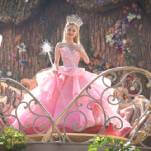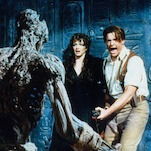The Statement

It's hard to say which is more distracting: having a mostly British cast play French characters by affecting froggy accents, or having them speak in their normal voices, as if France had been widely colonized after the Napoleonic Wars. In lieu of casting actual French people, veteran director Norman Jewison opts for the latter approach in The Statement, clearly hoping the audience can make an imaginative leap and pretend that Cockney and Vichy are somehow similar. But while it's reasonable for Jewison to expect some suspension of disbelief, the lingual mishmash points to the carelessness and apathy that blanket the production. On the heels of Costa-Gavras' halfhearted provocation Amen., The Statement tags the Catholic Church as a sinister Nazi collaborator (or, at least, an enabler) during WWII, but lacks the passion, immediacy, and authenticity to make the label stick. With all the fervent anticipation over Mel Gibson's The Passion Of The Christ, it's surprising that the story of a right-wing Catholic cabal harboring a Nazi war criminal could slip quietly under the radar, but Jewison isn't a born provocateur. (Had Spike Lee not taken over the project, Jewison's Malcolm X would likely have resembled an episode of The Cosby Show.) A true professional, Michael Caine gooses up the drab proceedings with his quietly unsettling turn as a former Vichy policeman who once executed seven Jews under Nazi command. Jump ahead to 1992 Provence, where the long-since-pardoned Caine is targeted by assassins allegedly sent by a radical Jewish group intent on avenging its ancestors' deaths. Also in hot pursuit are a doggedly persistent Paris judge (Tilda Swinton) and a French Army detective (Jeremy Northam), who seek to uncover the powerful men who have been protecting Caine. Their investigation pits them against a shadowy rightist Catholic sect that has routinely obstructed justice in giving Caine shelter and financial support. In Jewison's hands, this cat-and-mouse game plays like third-rate John Le Carré, treading lethargically over high-minded intrigue that mixes fact, fiction, and unlikely speculation in dubious relation to the historical record. The Catholic establishment doesn't often inspire pity these days, but it's been hit with a cheap shot here. Still, no one is more skilled at surviving bad cinema than Caine, who burrows deeply into an irredeemable monster who strives for grace, even though he seems to know that he can never outrun his demons. The relationship between his enduring sins and his constant need for absolution creates a powerful tension in itself, and it deserves a movie of its own.







































